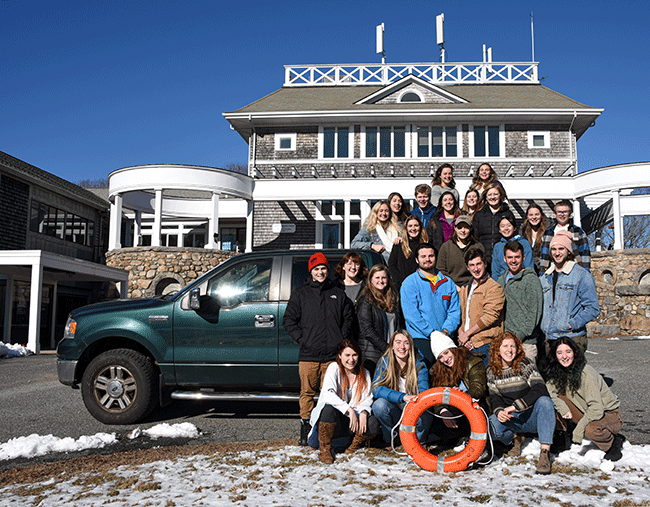Programs Blog
Interdisciplinary Week #2: Marine Populations

Ava-Rose Beech, Kenyon College
Last Friday brought a close to our second full week of classes at the Woods Hole Campus. The theme for last week–marine populations– led us to a wide range of topics and discussions. Whether it was leafing through the pages of whaling logbooks filled with intricate illustrations of whales, flying fish, and porpoises at the New Bedford Whaling Museum, or discussing the complexities of the policy that regulates fishery management, our studies gave us a deeper understanding of the integral role marine populations play in our lives.
At the end of the week, last Friday, we had the second of our weekly interdisciplinary discussions. The aim of these conversations is to integrate and reflect on all we have learned and thought about relating to the week’s theme. The group conversation quickly progressed to large scale questions, asking what our role as individuals is in protecting marine populations. We discussed whether change is catalyzed from a bottom up or top down approach, and asked how it is possible for us to actually make a difference in mitigating the vast environmental challenges we face.
For the second week in a row, the conversation was paused half way through, to redirect our attention to the topic of discussion: marine populations. It seems to be a trend within our class to become so engrossed in understanding what our role is as environmentalists, and the ways that we can catalyze change, that we quickly lose track of the specific topic of discussion. We brought our focus back to marine populations by considering the interconnectedness of ocean populations to global ecosystems. Our conversation speaks to the ways we, as a group, are considering the importance of our individual actions. Throughout our time in Woods Hole, we have spent a lot of time reflecting on the ways in which we are intrinsically connected to, and reliant upon our environments. In the same way, we will be connected to each other, and deeply reliant upon one another other at sea. I am looking forward to continuing to form new connections both with my fellow shipmates, and the environments we will be engaging with, as we prepare to set sail in less than a month!
– Ava-Rose Beech, Kenyon College
Recent Posts from the Ships
- Ocean Classroom 2024-A collaborative high school program with Proctor Academy
- Collaborations and Long-term Commitments: SEA’s Caribbean Reef Program Sets a Course for Coastal Programs that Compliment Shipboard Experiences.
- Sea Education Association students prepare for life underway using state of the art nautical simulation from Wartsila Corporation.
- SEA Writer 2022, Magazines From the Summer SEA Quest Students
- Technology@SEA: Upgrades Allow Insight into Ocean Depths
Programs
- Gap Year
- Ocean Exploration
- High School
- Science at SEA
- SEA Expedition
- SEAScape
- Pre-College
- Proctor Ocean Classroom
- Protecting the Phoenix Islands
- SPICE
- Stanford@SEA
- Undergraduate
- Climate and Society
- Climate Change and Coastal Resilience
- Coral Reef Conservation
- Marine Biodiversity and Conservation
- MBL
- Ocean Exploration: Plastics
- Ocean Policy: Marine Protected Areas
- Oceans and Climate
- Pacific Reef Expedition
- The Global Ocean: Hawai'i
- The Global Ocean: New Zealand